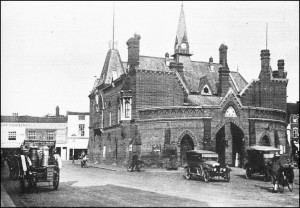Our focus on the government of the Great War tends to be at national level, but Jim Bell’s extensive research has enabled us to look into local government from a Wokingham viewpoint. His latest book ‘Memories of the Town Hall’ was published last week.
This article takes a brief snapshot of the Mayor’s actions during the war and emphasises the point that many others apart from the Fallen became casualties. We take these casualties to be loved ones, family and friends, but there were also the administrators of the local community who together experienced close knit and life long relationships.
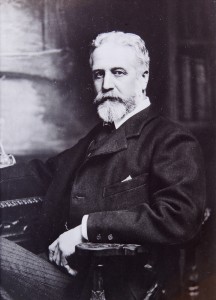
Henry Charles Mylne was re-elected as Wokingham’s Mayor in 1914. His colleagues believed his early death was due to the unceasing efforts he made throughout the period.
We are still collecting information on Wokingham’s war years and at the moment it is strangely, somewhat spartan. We are lucky to have the Reading Standard’s excellent photographic record of the many killed and wounded, but the newspaper stories of the time ran very silent about the war itself. The news blackout of the war and a refusal to print stories which were obvious propaganda, were good reasons why there is little to access nowadays, but there may well have also been a good helping of ‘out of sight out of mind’.
As the war was being fought away from the country, the people could carry on much as normal and therefore we could expect to see communities split into two; those who had family at war and those who did not. Is this how the population of Wokingham felt? Probably not; Wokingham had a population of less than 4,500 and of the hundreds of family trees we have built up of the time, we know that many of them interconnected many times over. Therefore, it wasn’t just parents who felt the loss, but also uncles, aunts, cousins and second cousins too. Conversations around the town would have concentrated on whether or not there was news from the Front. As we build our knowledge of the town’s traders, we are also discovering just how many of their children and their employees were sent to war. On every trip to the shops there would have again been the regular conversation of how they were doing and the inevitable news of the losses. There is no doubt Wokingham would have felt the war very deeply and on a daily basis, not only the agony of loss, but also of the depressing anxiety of not knowing if their loved one would be next.
How did the local Council handle this unprecedented situation? The Council was unsurprisingly pro war, but there is a sense that it was for duty’s sake rather than the tub thumping call to arms that has often described the first months of conflict.
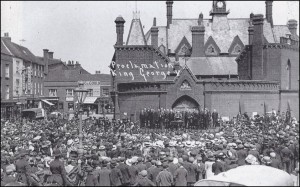
The Mayor proclaims the George V as King in 1910. Both men were to face extraordinary challenges in the coming years.
The Mayor, unlucky to be in position at the time of the outbreak was Henry Charles Mylne. He had the responsibility being both the voice of the government and the people at the same time and with no precedent to guide him as to what to do. H C Mylne was born in Edinburgh and with his wife Edith and daughter Emilia, lived in the large Staverton House at 25 Murdoch Road Wokingham. By 1911 he was a retired Civil Engineer and Mayor of Wokingham. Being Mayor at the outbreak of war put a great strain on him as one of his duties was to decide on whether or not men should be sent to war or held back for their skills in vital trades. At this point we do not know of the outcome of these decisions, but he would undoubtedly have had many sleepless nights worrying about them. He was also highly active in raising funds for the servicemen and was acknowledged as the driving force in raising remembrance funds after the war. As the men drifted back from war in 1919, many of them were in a terrible state and this again would have been very distressing for him.
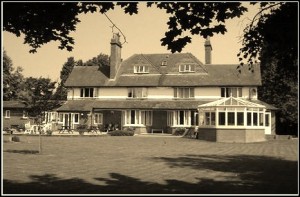
Mayor H C Mylne lived in Staverton House in 1911. As a public servant he gave up a good life in retirement and his friends believed the stress of the Great War killed him just a few months after the victory celebrations of 1919.
On 21st October 1919, just a few months after Wokingham’s victory celebrations, Henry died. When the St Paul’s Memorial was consecrated in 1922, Councillor Philip Sale stated that ‘when the tablet was erected in that hall, he would press for the name of Mr. Mylne to be inscribed thereon, for his work during the war had undoubtedly hastened his end’ (Reading Mercury 1922).
Councillor Sale had taken over the running of the memorial fund following Mr Mylne’s death, probably because he too had experienced the trauma of the war. He was the owner of a local business and one of his employees Clarence Trill, was killed and named on the same memorial. When the Memorial was finally opened in the Town Hall in 1924 Councillor Sale again stated that the pressures of the war brought about H.C. Mylne’s early death. The delay in building the memorial came out of the council’s difficulty in agreeing how best to spend the money which had been raised by the local community. A memorial had been agreed, but there was also a need for a Comrades Club, which would have enabled returning soldiers to come together in mutual support. They needed it; many were mentally and physically disabled and found comfort only in the company of those who understood.
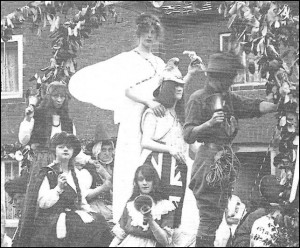
Wokingham had a great party to celebrate the end of the War in 1919. Not all the townspeople would have been in a festive mood, least of all Henry Mylne.
Although it was felt there was a more pressing need to care for the wounded men, what eventually won the day was the future: a children’s hospital. The old Methodist building at the bottom of Denmark Street was purchased and converted into the Orthopaedic Clinic and ran successfully for many years.
Mayor H C Mylne’s experience demands great sympathy, but it also tells us of the very close relationship the townspeople and the Council had in running Wokingham for the collective good. Much of the funds at that time were raised by the good will of local people and therefore this relationship was vital if the town was to progress as a unit.
1st November 1919 Reading Mercury:
THE LATE ALDERMAN MYLNE
‘At a parochial meeting of All Saints’ held on Thursday last week, in the Church House, the Rector (Rev. B. Long), who presided, made feeling reference to the loss sustained by the death of Mr. Henry Charles Mylne, and proposed a resolution expressing the deep feeling of the meeting at the loss which as individuals and the Church in that place they had sustained, placing on record the recognition of and gratitude for the great benefit from the example of his life and the devotion of his time and powers to the service of God and the welfare of his fellows. Respectful and heartfelt sympathy was extended to Mrs. and Miss Mylne.
Admiral Eustace referred to the late Mr. Mylne as not only a great citizen but a friend to them all.
Mr. Hammond, a member of the Town Council, said he had known Mr. Mylne for nearly ten years, and he was sure that if ever a man laid down his life for his town and country that man was Mr. Mylne.
The resolution was carried by a silent, standing vote.
The Rector then offered prayer, commending the soul of the departed to God, and asking the comfort and blessing of God upon the bereaved relations.’
Jim Bell’s book tells us much more of how this relationship developed and gives an insight into how the councils grew from small, under funded meetings in the Parish vestries and into the powerful organisations we experience today. You can pick up a copy of Jim’s book at the Information Centre in the Town Hall for the very un-princely sum of just £3. Here is a list of further reading material about the life and times of Wokingham: http://www.wokinghamsociety.org.uk/wokingham_publications.html

